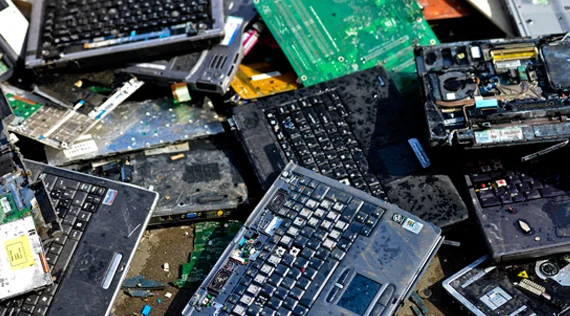A new wave of computers, smartphones and accessories enter the market with smaller components made from increasingly complex materials.
SEATTLE (Scrap Monster): A new wave of computers, smartphones and accessories enter the market with smaller components made from increasingly complex materials.
Even as awareness of e-waste has grown and the circular economy has begun to spread its wings, progress is being undermined by a disposable culture in the tech industry.
A new Greenpeace study suggests consumers have had enough. A survey of 6,000 people across the U.S., China, Mexico, Russia, Germany and South Korea revealed that over half of consumers want manufacturers to release fewer phone models and do more to help them recycle their old devices.
Respondents reported they currently owned an average of at least three phones (in use and not in use) – and the average was more than five in Russia and Mexico. More than one third indicated “getting a more up-to-date device” was the reason for their most recent phone purchase, while less than three in ten answered it was because their previous phone was broken or got lost.
With new designs released each year, waste companies are struggling to adapt their sorting technology. Smartphones, for instance, can include up to 50 different types of metal. Similarly, plastics can contain over 25 different compounds, which makes recycling more difficult.
“When you look at the design of products, you see several trends that are not helping enable the circular economy,” said Dr. Tjerk Wardenaar, who coordinates the European Union (EU)-funded NEW_InnoNet project, which is re-examining value chains.
“You see a trend of miniaturisation, everything has to be smaller and smarter, and this makes it more difficult at the end of the value chain to recover materials,” he continued. “Second, you see increasingly complex materials that are more difficult to take apart at the end of the lifecycle. Then, there is an increasing and rapid update of products.”
Several EU-funded projects are working to help solve different aspects of the problem. For example, NEW_InnoNet brought together experts from different industries with specializations in electronic, automotive and plastic production to identify bottlenecks for the near-zero-waste economy.
It aims to highlight key research and innovation priorities that have thus far been overlooked due to a lack of communication between specialists at different parts of the value chain. Another project, UrBAN-WASTE, is developing strategies to support the reuse, recycling, collection and disposal of waste with a focus on cities (where almost 80 per cent of the European population lives).
Eleven cities have been selected to pilot the implementation of circular economy strategies among different groups such as hotels, restaurants and municipalities. In October, WRAP announced an EU LIFE-funded project to explore commercial opportunities for recovering critical raw materials and precious metals from everyday electronic products. EU recycling laws that require member states to collect certain amounts of e-waste are beginning to take effect. By 2019, collection targets in the EU will rise to 85 per cent of the weight of electronic equipment sold, The Guardian reports.
“The recycling rate of mobile phones is particularly low compared to other electronic goods, and people don’t know if they can contact recycling companies, the government or the brand. Most don’t know how to wipe data, but that’s the first thing certified recycling should provide,” Greenpeace global detox campaigner Chih An Lee told The Guardian.
“Recycling isn’t the solution to the problem, but it is an essential step. In the future, companies need to reshape their business model to move towards a circular economy. They should make profit from good recycling, recovering materials and producing long-lasting batteries. Consumers need to make their demands heard.”
The Greenpeace survey showed that more than 80 per cent of consumers wanted smartphones to be designed to last and be easy to fix. Only 9 per cent of German respondents had the experience of having damaged phones repaired by the manufacturer, while China enjoyed the highest with 36 per cent.
In South Korea, 57 per cent of respondents had sold or given their old phone to a specialized recycling company, but only 11 per cent of respondents in Germany said the same. Nearly half of all respondents believe that mobile phone manufacturers should be the most responsible for making recycling accessible; the sentiment was particularly strong in Germany (61 per cent) and China (53 per cent).
The release of the findings marked the start of a campaign to “make electronics truly innovative” and challenge the industry to reduce energy and toxic chemical use, eliminate programmed obsolescence, and improve e-waste recycling and workers’ health. Greenpeace envisions devices that are designed to be long-lasting, “toxic-free,” and easy to repair and dismantle to facilitate a closed-loop system.
Some companies, such as Fairphone and Nascent have already begun to design for such a future in electronics. The Fairphone 2 was designed to be longer-lasting and repairable as well as ethically sourced; the company established traceable supplies for all four conflict minerals in June. The Nascent Objects platform, launched in March, offers a customizable system of interchangeable electronic modules that can be used to assemble a variety of consumer products, according to news agencies.
Courtesy: www. thefinancialexpress-bd.com





 Member
Member